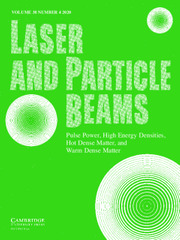Article contents
Modification of materials surface using plasma enhanced ion beams
Published online by Cambridge University Press: 09 March 2009
Abstract
The paper presents experimental results on the application of microsecond plasma opening switch (MPOS) technology for materials surface modification. The ion beam parameters generated by the MPOS are up to 250 keV energy and current density and energy densities of up to 150 A/cm2 and 2.2 J/cm2, respectively. Characterization of the treated samples showed structural changes to a depth of several microns. The small ion range (few microns) and fast cooling of the upper melted layer (up to 1010 K/s) result in formation of fine-grain structures characterized by improved corrosion and erosion properties. Measurements indicate an increase in microhardness of a factor of about 3 for carbon steel samples. Corrosion resistance increase for the treated samples of at least 3, as measured by mass loss and potentiodynamic methods, has been measured for Al alloys. Microstructural changes in the surface morphology indicate a reduction in grain size for the treated samples and the appearance of shallow craters. Results of numeric simulations are given for the temperature distribution in materials due to ion beam heating.
Information
- Type
- Regular Papers
- Information
- Copyright
- Copyright © Cambridge University Press 1998
References
REFERENCES
- 4
- Cited by

